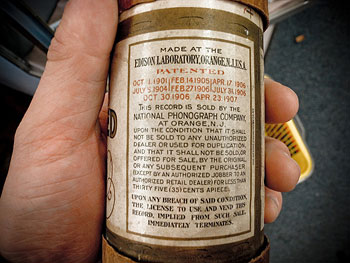Image from: http://www.sympathyrecords.com/news/graphics/einstein.jpg
I thought that the NPR interview was very interesting. I think that all industries, including the music industry, were caught "with their pants down" when the digital age and the intervention of the Internet took place. There are several facets to this argument, both positive and negative. This post will be a short summary of each facet that I gleaned from this interview.
From a technology standpoint, the digital age has benefited (and hurt) the Music Industry. The Audio Home Recording Act was the first visible industry reaction to changing technologies. The vinyl record led way to the cassette tape formats, which led way to compact discs, which led way to the digital formats, including Digital Audio Tapes and different file formats. The technology formats opened up new ways of distribution which created profit loss and ownership problems for the Record Industry. The Audio Home Recording Act was a feeble attempt to prevent the number of copies a consumer could make of a song or album that they purchased as well as setting precedents in letting the government become involved in the Music Industry. On the other hand, the quality of music became better over time. There will always be the long standing argument of the "warm sound" of vinyl versus the "cold sound" of digital music, but that is a post for another time. As technology evolved, the quality of music increased while the file size of music formats decreased, improving portability and sharing capabilities. Peer sharing software programs such as Napster and Limewire enabled users to share access to basically the whole library of music created by the human race.
A Brief History of Filesharing: From Napster to Legal Music Downloads
The History of Napster
Image from: http://boingboing.net/images/recordindustry1900fineprint.jpg
Distribution problems arose from the technology evolution. No longer was middle management of record labels controlling the ebb and flow of massaging local promoters, radio stations and record stores. Peer sharing networks and the advent of the iPod pretty much decimated that line of management in a matter of a few years. Now people could pick which songs they wanted to hear, buy and/or download without purchasing the whole album. As illegal music downloading and piracy increased from peer sharing, the Recording Industry went after purveyors of the sharing software, launching over some 35,000 lawsuits. According to the interview for this assignment, the RIAA has stopped pursuing new lawsuits, but are still going after the original pirates of music that were targeted.
Image from: http://resonantvibes.com/blog/wp-content/uploads/2008/10/illegal-downloading1.jpg
Artists and record labels have had to adjust how to interact with the Music Industry since the digital age changed the face of the industry. Payola schemes are replaced with up and coming artists using Facebook and Myspace to unveil their latest songs. The record store has been replaced with iTunes. The mix tape has been replaced with the CD and the iPod.



Michael! Excellent. I might have to use this information in my classes when we talk about filesharing - legal and illegal. Excellent resources!
ReplyDelete~Jeanette
RIAA, RIP.
ReplyDelete